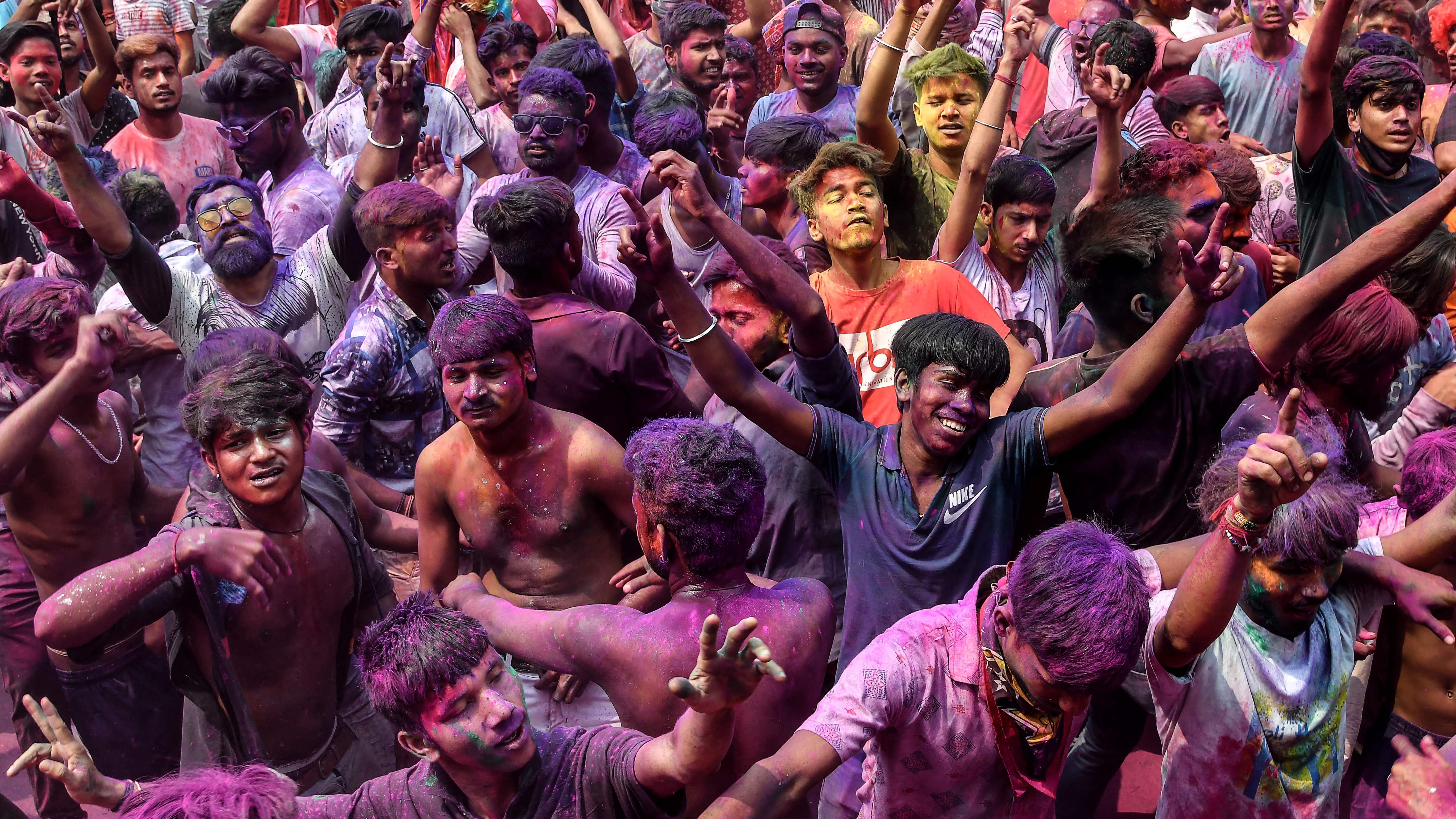‘Double mutant’ Covid variant threatens to overwhelm India
Hopes of herd immunity extinguished as wave of new strain sweeps across the country

A free daily email with the biggest news stories of the day – and the best features from TheWeek.com
You are now subscribed
Your newsletter sign-up was successful
Hospitals across India are nearing breaking point as a new double mutation of the coronavirus triggers a spike in Covid cases.
More than 68,000 new Covid infections were recorded on Monday - a sixfold increase since mid-February - as a growing number of Indian states report cases of the variant, which threatens to “reverse India’s pandemic gains”, says The Indian Express.
The sudden surge is “triggering fear that India’s ‘second wave’ could be more dangerous than the first”, the Chennai-based paper adds - fears that have been heightened by reports of “several other variants in at least 18 states”.
The Week
Escape your echo chamber. Get the facts behind the news, plus analysis from multiple perspectives.

Sign up for The Week's Free Newsletters
From our morning news briefing to a weekly Good News Newsletter, get the best of The Week delivered directly to your inbox.
From our morning news briefing to a weekly Good News Newsletter, get the best of The Week delivered directly to your inbox.
‘Tip of the iceberg’
International health experts are warning that the double mutation discovered in India of “grave concern” and is likely to “spread to other countries”, according to CNBC.
India’s Health Ministry says the new strain carries two mutations of the coronavirus, E484Q and L452R, that “are not new”, the US broadcaster reports. But the combination of the two is “something that has not been seen in other variants”.
“Double mutation happens when two mutated variants of a virus come together to form a third variant,” M.C. Mishra, a former medical superintendent at the All India Institute of Medical Sciences, told Deutsche Welle.
A free daily email with the biggest news stories of the day – and the best features from TheWeek.com
“This double mutant could be a major reason behind the upsurge in Covid cases, but we need to wait for test results to determine if it is the case,” Mishra added.
“The L452R variant was first found in the US, whereas the E484Q variant is indigenous,” says The Indian Express. An analysis of samples collected from India’s western state of Maharashtra has revealed local rises in the two mutations since December.
As the variants continue to spread, finger pointing has begun.
The government in New Delhi “has been slow to sequence positive Covid-19 cases”, despite repeated “warnings from public health experts that this could result in new strains circulating unknowingly in India’s densely populated megacities”, says The Telegraph.
India is currently genetically sequencing only around 0.1% of positive cases, compared with 5% in the UK, so emerging variants are not likely to be detected until a large number of people are already infected.
Doctors in the South Asian nation’s worst-hit regions are concerned that new variants are driving an “increase in younger patients and patients being admitted for longer”, the paper adds.
“What we are generally noticing is that people are getting infected much faster. Earlier, we were seeing one member of a family getting infected and isolating successfully, but now we are seeing whole families coming in,” said Dr George Fernandes, CEO at Viveka Hospital, the biggest private Covid-19 centre in central India.
“People are being hospitalised for ten days, rather than five to seven days, as during the first wave. We are definite that the mutation is around, but it is too early to say what the exact effects are.”
Medics in other countries are also anxious about the potential risks posed by the new double mutation strain.
Dr Kavita Patel, a non-resident fellow at the Brookings Institution in Washington D.C., told CNBC that “it is something to watch very closely, and something that will not be limited to India. It is something we will likely see around the world as we have with other variants.”
“This double mutation, number one, is incredibly serious. Number two, it is probably just the tip of the iceberg in what we would worry about in Asia,” added Patel, who served as a policy director in the Barack Obama administration.
‘Five-step strategy’
The total tally of Covid cases reported in India stands at more than 12 million, while the death toll is approaching 165,000, according to latest figures from John Hopkins University.
The rise of the double mutation has dashed hopes that India had achieved a degree of herd immunity. Optimism rose after cases fell from around 100,000 infections per day in September to 11,000 per day in February.
Such a dramatic drop is unusual, especially as the country did not take any obvious steps to reduce infections, while also gradually reopening its economy over the same time period.
But whatever the reason for the brief respite, India’s healthcare system is now buckling under the strain of the fresh wave of infections.
Bosses at four major private hospitals in Nagpur, a city of 2.4 million people in Maharashtra, told The Telegraph that their facilities were at full capacity - a pattern being repeated across much of the country.
The newspaper adds that “local healthcare activists claim public hospitals are unable to admit patients without a high-profile referral”, while Indian news channel NDTV reports that viral photos on social media show that pairs of patients are being “crammed into single beds” at the Nagpur Government Medical College Hospital.
Amid calls for urgent action, Health Secretary Rajesh Bhushan has announced a “five-step strategy” to drive down infections, “including effective containment and contact tracing for at least 14 successive days in 46 districts”.
The government “urged state health authorities to do their best to make sure that the new situation doesn’t undo India’s last year gains”, The India Express reports. The country’s vaccination drive is set to enter the third phase, in which over-45s can get Covid jabs, from tomorrow.
Meanwhile, Holi - the Hindu festival celebrating the advent of spring - was celebrated in unusually muted style earlier this week. “For the second consecutive year, people were encouraged to stay home to avoid turning the festivities into superspreader events,” Al Jazeera reports.
But while state officials are continuing to call for social distancing, Brookings Institution expert Patel believes the key to curing infections is to vaccinate - and vaccinate fast.
“If I were an Indian health official, I would be very concerned about this mutation on the Covid response globally,” she told CNBC. “I would also be thinking about how we can get vaccinations to as many people as possible.”
Joe Evans is the world news editor at TheWeek.co.uk. He joined the team in 2019 and held roles including deputy news editor and acting news editor before moving into his current position in early 2021. He is a regular panellist on The Week Unwrapped podcast, discussing politics and foreign affairs.
Before joining The Week, he worked as a freelance journalist covering the UK and Ireland for German newspapers and magazines. A series of features on Brexit and the Irish border got him nominated for the Hostwriter Prize in 2019. Prior to settling down in London, he lived and worked in Cambodia, where he ran communications for a non-governmental organisation and worked as a journalist covering Southeast Asia. He has a master’s degree in journalism from City, University of London, and before that studied English Literature at the University of Manchester.
-
 The Olympic timekeepers keeping the Games on track
The Olympic timekeepers keeping the Games on trackUnder the Radar Swiss watchmaking giant Omega has been at the finish line of every Olympic Games for nearly 100 years
-
 Will increasing tensions with Iran boil over into war?
Will increasing tensions with Iran boil over into war?Today’s Big Question President Donald Trump has recently been threatening the country
-
 Corruption: The spy sheikh and the president
Corruption: The spy sheikh and the presidentFeature Trump is at the center of another scandal
-
 A Nipah virus outbreak in India has brought back Covid-era surveillance
A Nipah virus outbreak in India has brought back Covid-era surveillanceUnder the radar The disease can spread through animals and humans
-
 Trump HHS slashes advised child vaccinations
Trump HHS slashes advised child vaccinationsSpeed Read In a widely condemned move, the CDC will now recommend that children get vaccinated against 11 communicable diseases, not 17
-
 A fentanyl vaccine may be on the horizon
A fentanyl vaccine may be on the horizonUnder the radar Taking a serious jab at the opioid epidemic
-
 Health: Will Kennedy dismantle U.S. immunization policy?
Health: Will Kennedy dismantle U.S. immunization policy?Feature ‘America’s vaccine playbook is being rewritten by people who don’t believe in them’
-
 How dangerous is the ‘K’ strain super-flu?
How dangerous is the ‘K’ strain super-flu?The Explainer Surge in cases of new variant H3N2 flu in UK and around the world
-
 How music can help recovery from surgery
How music can help recovery from surgeryUnder The Radar A ‘few gentle notes’ can make a difference to the body during medical procedures
-
 Vaccine critic quietly named CDC’s No. 2 official
Vaccine critic quietly named CDC’s No. 2 officialSpeed Read Dr. Ralph Abraham joins another prominent vaccine critic, HHS Secretary Robert F. Kennedy Jr.
-
 This flu season could be worse than usual
This flu season could be worse than usualIn the spotlight A new subvariant is infecting several countries